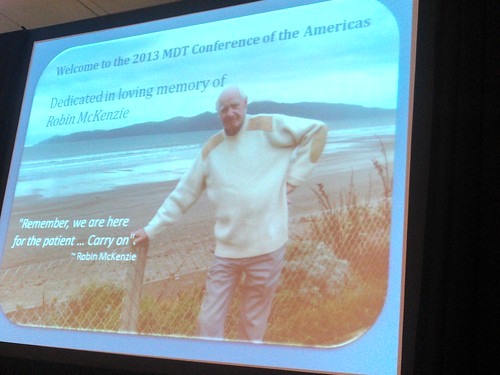 This past weekend, the city of Denver hosted the McKenzie Institute Americas Conference. I made the trek to Denver to take part in what was, according to my calculations, my 14th McKenzie conference. Where has all the time gone?
This past weekend, the city of Denver hosted the McKenzie Institute Americas Conference. I made the trek to Denver to take part in what was, according to my calculations, my 14th McKenzie conference. Where has all the time gone?
As has become the norm over all of those years, the conference was chock full of current research and insightful presentations. Add to that the thought-provoking and insightful discussions after hours with colleagues from around the world.
Sadly, the 2013 edition was the first conference since the passing of Robin McKenzie. Though the conference began with a moment of silence and tribute to Robin McKenzie, it ended with a powerful reminder that there are a dedicated group of clinicians poised to forge ahead with his legacy.
There is no doubt that the McKenzie Institute conferences continue to be a good value for continuing education dollars. Contrary to what many clinicians may believe, the speakers are not all exclusively MDT-specific. But when you arrive, you do know that you will be in an environment in which self treatment and mechanical assessment are at the core of the discussion.
The theme of this year's conference was "MDT For Peak Patient Outcomes". Though the overall quality of the presentations and workshops was tremendous, there were three notable highlights.
1. Mark Werneke, MPT, Dip.MDT and Daniel Deutscher, PT, PhD presented sessions on "Outcome Data Assessment Fundamentals" and "Practice-Based Evidence (PBE)". They discussed the importance of serial data collection, risk adjustment, and the importance of finding the right treatment for the right patient. Their outcomes data (as a part of the FOTO, or Focus On Therapeutic Outcomes, database) indicates that 6 of the top 10 performers for low back pain (out of a pool of over 8,000 physical therapists nationwide) are either Cert. or Dip. MDT.
Side note: what makes this data even more intriguing is the limited presence of MDT in DPT educational programs. Based on the data presented, this is a rather significant oversight in preparing students for the realities of the clinical world. But I digress.
2. Annie O'Connor, PT, OCS, Cert. MDT gave two intriguing presentations entitled "You Don't Get Pain Without A Brain", an overview of the role of the central nervous system pain mechanisms, and "Pain, A Continuum Of Mechanical And Psychological Mechanisms". She described how these mechanisms complement the mechanical syndromes proposed by McKenzie, especially in mechanically inconclusive diagnoses.
Side note: for all of the clinicians thinking that MDT doesn't include "the brain" or “the neuromatrix”, I would suggest that the important take-home message would be "MDT is a cognitive-behavioral treatment approach".
3. The final day ended with a session by Mark Miller, PT, Dip. MDT and Chad Gray, PT, Cert. MDT called "How MDT's Value Proposition Should Lead The Changing Orthopedic Market". This was an overview of some of the work they have done with businesses that are self-insured (i.e. Michelin), and the cost savings established with the use of MDT. As an example, Michelin's single largest health care cost is musculoskeletal care. Days to full recovery were reduced from the industry standard 84 days to just 27.4 days. An industry standard recurrence rate of 60% was reduced to 5.4%, and the average cost per member per month was reduced from $195.00 to $108.60 (a reduction of 44%).
Side note: Outcomes, outcomes, outcomes. Oh, and cost savings. Need I say more?
It is also of note that the Twitterverse was well-represented at the conference, with the hashtag #MDTAmer2013 and tweets from myself, @McKenzieUSA, @JasonWardPTMDT, @BetterPT, @jtarsijr, @NickTNpt, @PTDavidG, @mckgeek, @fotoinc, @midsouthortho1, and @davea2physio. Add in the presence of @AskDrYoav and @Wilde_Pete and you have quite a bunch of Tweeters in the MDT community. I hope I didn’t miss anyone!
And, of course, there were the countless late-night discussions with fellow clinicians, the wonderful opportunities to develop new friendships, and the sheer pleasure of catching up with old friends and colleagues from around the world.
Much as the McKenzie Institute will miss Robin's presence, it is safe to say that the future of MDT is bright. Be it in the realms of research, outcomes, or clinical practice, MDT is forging full-steam ahead.
Onwards to the next McKenzie Institute International Conference in Copenhagen in 2015!
Photo credits: abesselink
 "Running Injuries: Etiology And Recovery- Based Treatment" (co-author Bridget Clark, PT) appears in the third edition and fourth editions of "Clinical Orthopaedic Rehabilitation: A Team Approach" by Charles Giangarra, MD and Robert C. Manske, PT.
"Running Injuries: Etiology And Recovery- Based Treatment" (co-author Bridget Clark, PT) appears in the third edition and fourth editions of "Clinical Orthopaedic Rehabilitation: A Team Approach" by Charles Giangarra, MD and Robert C. Manske, PT.
 Allan Besselink, PT, DPT, Ph.D., Dip.MDT has a unique voice in the world of sports, education, and health care. Read more about Allan here.
Allan Besselink, PT, DPT, Ph.D., Dip.MDT has a unique voice in the world of sports, education, and health care. Read more about Allan here.
 Top 5 finalist in three categories: "Best Overall Blog", "Best PT Blog" and "Best Advocacy Blog".
Top 5 finalist in three categories: "Best Overall Blog", "Best PT Blog" and "Best Advocacy Blog".